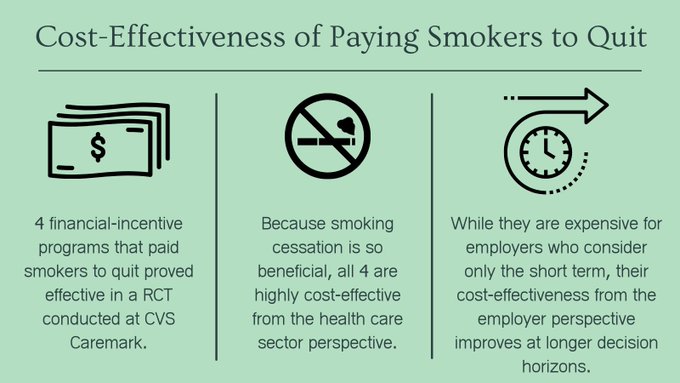
One Agency’s Maps Are Known For Documenting Redlining
But Many Other Factors Played a Role in Denying Loans, LDI Fellow Says
Population Health
Blog Post
From a societal perspective, paying people to quit smoking is highly cost-effective, because the benefits of smoking cessation are so great. That’s one of the main takeaways from a new study by Louise B. Russell and colleagues. At the same time, the study also helps us understand why employers might be reluctant to implement financial incentive programs in the workplace, given their shorter decision horizons and the fact that the benefits may accrue long after the employee leaves the company.
The study evaluates the cost-effectiveness of a randomized trial of financial incentives conducted with employees of CVS Caremark. The financial incentives, which ranged from $800 to $1,940 per quitter, led to much higher quit rates at 6 months. Although that sounds expensive, the life expectancy gains from quitting smoking are large so the cost might be worthwhile.
Using data from the trial, Russell and colleagues estimated life expectancy gains (in life-years), quality of life gains (in quality-adjusted life-years, or QALYs), health care costs, and employer costs. They compared two perspectives: the societal one, which includes all health gains and costs (regardless of payer) over participants’ remaining lifetimes, and the employer one, which includes only costs paid by the employer over a five-year time horizon.

Their findings are eye-opening. Compared to business-as-usual, the incentive programs were quite cost-effective from a societal point of view: $3,200 -$6,500 per life-year ($2,500-$5,100 per QALY). But would implementing the program be a good business decision? From the employer perspective (which also takes employee turnover into account), costs ranged from $256,600-$1,711,100 per life-year. Because quality of life gains are larger than life-expectancy gains in the early years, the cost per QALY is much lower, but still substantial: $65,300-$128,800 per QALY. The cost-effectiveness improves considerably if employers use a longer decision horizon (such as 20 years). But it is not likely that a single employer will retain the employee for that entire time, meaning that the gains will accrue to a different employer.
These findings explain why many employers may be reluctant to take on the substantial upfront costs of these effective programs, even though the eventual health “payoff” from quitting smoking is quite large. The authors suggest that the costs of these programs might be shared between employers and insurers, to make it more likely that they reach the people who wish to stop smoking.
The study, Cost-Effectiveness of Four Financial Incentive Programs for Smoking Cessation, was published in the December 2021 issue of the Annals of the American Thoracic Society. Authors include Louise B. Russell, Kevin G. Volpp, Pui L. Kwong, Benjamin S. Cosgriff, Michael O. Harhay, Jingsan Zhu, and Scott D. Halpern.

But Many Other Factors Played a Role in Denying Loans, LDI Fellow Says

Offit and Buttenheim Criticize HHS Placebo Trial Mandate as Unethical, Misleading, and a Threat to Vaccine Confidence

A Penn LDI Virtual Seminar Explores the Latest Trends in Anchor Institution Operations

Neighborhood Perceptions May Also Affect PTSD and Depression Recovery After Serious Injury

A Penn LDI and Opportunity for Health Lab Virtual Seminar Explores Economic Assistance Programs

Testimony: Delivered to Philadelphia City Council